
Aesthetics
INFORMATIONS
-
Objectives and content
The Aesthetics class studies musical works and their relationships with the non-musical world from a cultural and historical perspective, from the triple point of view of composition, performance and reception.
The Aesthetics course, which is common to students in both years, is divided into two parts:
- The first stage, corresponding to the first part of the year, will focus on a notion, a parameter of music, or a concept that will be deployed through a vast corpus and in a broad periodisation.
- The second phase, corresponding to the second part of the year, will focus on one composer or a body of works and compare them with a set of aesthetic notions and/or with the artistic and cultural context of the period.
-
Entrance terms and conditions
Entrance examination 2025-2026
Age limit: under 28 on1 October 2025.
Application period: 6 January to 10 February 2025 on the Conservatoire de Paris website.
1. Preliminary tests
These tests are common to both the preparatory musicology cycle entrance examination and the advanced musicology cycle entrance examination.
Success in the eliminatory tests is definitive for all subsequent competitions.
1.1Music training
- Written test (duration: 1h30)
- Dictation with missing parts from the recorded repertoire, which may contain rhythmic, melodic and harmonic statements.
- Monodic atonal reading and recognition of cadences and keys.
- Oral test
- Walk through an orchestral conductor including transposing instruments with rhythmic and sung reading on audio support (prior dressing room: 10 minutes).
These tests are common to the entrance examinations for the Advanced Musicology Cycle (Theoretical and Applied Analysis, Aesthetics and History of Music classes) and the Preparatory Cycle.
The following are exempt from this test
- students or former students in the advanced writing, composition, orchestration, conducting, accompaniment, keyboard improvisation, voice conducting, vocal accompaniment and choreographic accompaniment classes at the Paris Conservatoire;
- instrumentalist students who have passed the exemption exam or obtained the Music Training certificate from the Paris Conservatoire;
- holders of the Diplôme d'État de Formation musicale ;
- holders of the following Certificats d'Aptitude : Formation musicale, Culture musicale, Écriture, Accompagnement, Professeur animateur et Directeur.
- Candidates admitted to the agrégation in music;
- Holders of a DEM in music training or orchestral conducting;
1.2 Vocal or instrumental practice
Performance of a work or excerpt from a work of the candidate's choice lasting no more than 5 minutes.
This test is waived for
- students or former students in the instrumental classes of a CNSMD ;
- holders of a Diplôme d'Etat or Certificat d'Aptitude in instrumental or vocal performance;
- holders of a specialised cycle award (acquired) from a CRD or CRR, a Conservatoire Municipal d'Arrondissement de Paris, a brevet d'exécution from the Ecole Normale de Musique de Paris, or their equivalent from a school abroad, less than five years old.
Proof of these qualifications must be provided at the time of registration.
2. Eligibility tests
The entrance examinations consist of two modules:
- a module common to all disciplines ;
- a specific module.
Module 1: (Duration 4 h )
Test common to all four disciplines: three listening commentaries, one of which must include a score.
The commentaries may be accompanied by questions on specific points of analysis.
Each work or excerpt from a work will be played two or three times.Candidates who have already passed the entrance examination for the Musicology and Analysis department are exempt.
Module 2: (Duration 4 h)
Examination common to all three subjects: Aesthetics, History of music :
essay and/or text commentary.Candidates who have already passed the entrance examination for the Musicology and Analysis department are exempt.
3. Admission tests
Oral test
Appearance before the jury with a dressing room:- 1 hour of preparation and 45 minutes of performance time: a commentary on a quotation and a question on the history of music (17th-20th centuries) chosen by lot.
N.B. : Candidates admitted to the competitive entrance examination for the2nd cycle who are not nationals of French-speaking countries must present, before 30 June preceding their first enrolment at the Conservatoire, a certificate issued by a body approved by the French government attesting to a level of French at least equal to B1 on the Council of Europe's scale of common reference levels, before 10 December following their first enrolment at the Conservatoire, a certificate issued by a body recognised by the French government attesting to a level of French at least equal to B2 on the Council of Europe's scale of common reference levels. In all cases, students who have not fulfilled the aforementioned obligations by the end of their studies will not receive the diploma for the course they have taken.
Internal transfer to the Aesthetics class
Conservatoire students who have obtained :- a prize in Theoretical and Applied Analysis or a certificate in Musical Analysis B with Honours or First Class Honours
- two Certificates with Honours or First Class Honours in a choice of three subject areas (History of music - chronological and synthetic study, History of music - study of interpretation, Methodology and theories of musicology),
may enter the Aesthetics class without sitting the competitive entrance exam, subject to availability.
- Written test (duration: 1h30)
-
Assessment terms and conditions
Continuous assessment
Continuous assessment accounts for 50% of the final exam mark. It includes: essays, presentations, listening commentaries, score commentaries, preparation of dissertations and a compulsory dissertation assessed at the end of the first year by the teacher on a subject determined at the beginning of the year with his/her agreement.
SECOND YEAR Final Examination
Written examinations:A dissertation submitted in triplicate to the administration and filed on the digital platform indicated, no later than two weeks before the date of the oral examination, of a maximum length of 30 pages (excluding appendices) on a subject chosen in agreement with the professor.
Students taking part in the Prize during their3rd year must submit their dissertation by the end of the February holidays at the latest.Oral examinations:
Presentation on a subject chosen by the candidate from among the topics covered in class (duration: 30 min.),
Interview on the oral presentation and dissertation (duration: 20 min.).
Awards
Honours (Very Good, Good or Fair)
-
Duration of studies
2 or 3 years
-
Reward
Reward
-
Erasmus
No

